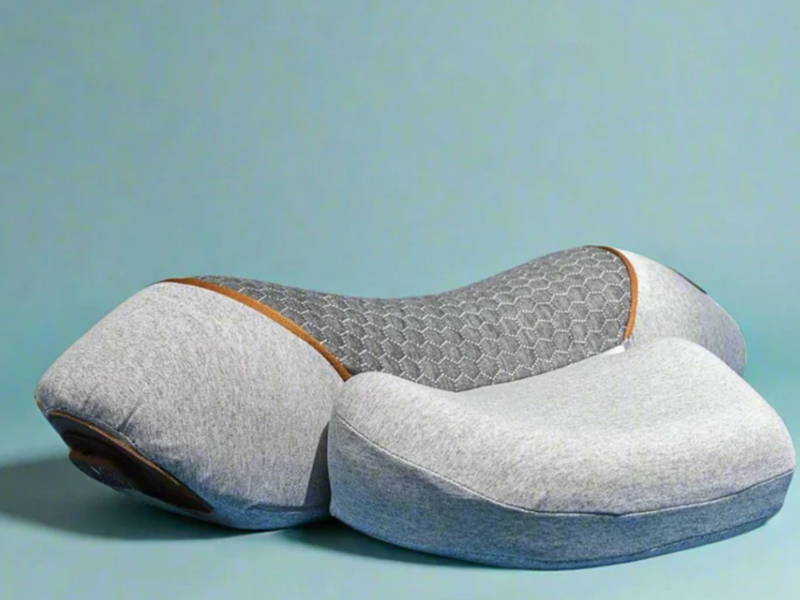

By Holly Grace Callis | Published on August 4th, 2025

You keep waking up sore, no matter how many times you adjust your pillow. Morning neck pain is more than a nuisance. It can be a sign that your pillow isn’t giving your body the support it needs.
And you’re not alone. Neck pain affects up to 20% of adults, or millions of people, every day. A poorly chosen pillow can make it worse. The right pillow doesn’t just improve comfort. It helps protect your spine, reduce tension, and support deep, restorative sleep.
This guide walks you through what to look for in a pillow for neck pain, what sleep and spine experts suggest, and how to match the right design to your sleep style.
Your neck and spine need structured support through the night. Without it, muscles tighten and joints shift into poor alignment. That misalignment is what leads to next-day soreness, stiffness, or even recurring headaches.
Even a high-quality pillow can be the wrong fit. If it’s too soft, too flat, or the wrong shape for your sleep position, it won’t hold your head in line with your spine. Over time, that mismatch contributes to pain that doesn’t go away easily.
Not all pillows are built the same. When neck pain is involved, the goal is to support the natural curve of your spine and reduce pressure on the neck muscles. The right features make a difference in how well your body rests and recovers overnight.
Your neck has a natural curve that needs steady support while you sleep. A pillow that follows this curve helps prevent the head from falling too far forward or tilting to one side. This keeps muscles relaxed and joints in proper alignment.
Structured support also reduces the chance of waking up with stiffness or headaches. Cervical pillows are designed with this in mind and help maintain that healthy alignment throughout the night.
Everyone’s body is different, and so is their shoulder width or sleep position. Pillows that offer height adjustment or contoured designs provide a better fit for more users. The contour helps keep your head cradled while relieving pressure around the shoulders and neck.
This shape encourages the spine to stay in a neutral position, reducing the tension that leads to pain.
The material inside your pillow matters just as much as its shape. Memory foam molds to your neck and head, offering customized support that holds its shape through the night. Latex is slightly firmer and more breathable, which helps with cooling and durability. Polyfill is softer but may flatten more quickly and offer less structured support.
Look for materials that provide support without collapsing. Breathable fabrics and ventilated cores can also help regulate temperature, which contributes to better sleep quality.
Your sleep posture affects how much support your neck needs. Back sleepers generally benefit from a medium loft that supports the neck curve without tilting the head forward. Side sleepers often need a higher loft with firm edges to fill the space between the head and shoulder. Stomach sleepers are more likely to strain their neck, but if that position is unavoidable, an ultra-thin pillow may reduce the angle of strain.
Matching your pillow to your sleep style helps keep your head, neck, and spine aligned and minimizes stress on your muscles.
Some of the most effective pillows for neck pain are those developed with input from physical therapists or tested in clinical settings. These designs often reflect what actually works for real patients, not just what feels soft or looks good in a catalog.
Pillows used in physiotherapy or referenced in clinical studies tend to offer more targeted support. They are often shaped to preserve the cervical curve, relieve pressure, and maintain proper alignment across a range of sleep positions.

Sometimes the problem isn’t the neck pain, but the ongoing strain your current pillow is placing on your spine. Watch for these common signs:
-You wake up sore, stiff, or with a dull headache
-Your pillow flattens or shifts during the night
-You often fold or double it just to feel supported
-Your pillow is more than one to two years old
These issues suggest that your pillow is no longer supporting your neck the way it should. An update could make a major difference in your sleep and pain levels.
A pillow plays an active role in how your spine rests and recovers overnight. Choosing one with proper support can reduce tension, improve alignment, and help you wake up without pain.
If you’ve been folding, fluffing, or fighting with your pillow every night, it’s time for a better solution. A well-designed cervical pillow helps you sleep in a healthier position and gives your body the support it needs to recover properly.
Try the Thera Pillow for 90 nights and start feeling pain relief with just one simple switch.

The best pillows for neck pain are cervical pillows with a contoured design. These pillows support the natural curve of the neck and help keep the spine aligned while you sleep. For back and side sleepers, medium to firm support works best. A pillow that holds its shape throughout the night helps reduce muscle strain and supports better recovery.
Chiropractors often recommend pillows that offer structured neck support, such as cervical memory foam designs with adjustable loft. These pillows help maintain alignment and reduce the pressure that builds from poor sleeping positions. The goal is to support the head and neck without tilting them out of alignment, especially for people with chronic neck or shoulder tension.
Orthopedic doctors usually suggest ergonomically shaped pillows that reduce stress on the cervical spine. Memory foam and latex are common recommendations because they contour to the body and support spinal alignment. The ideal pillow keeps your head level with your body and prevents your neck from flexing too far forward or to the side.
To prevent neck pain, use a pillow that supports your neck’s natural curve and keeps your spine in a neutral position. A contoured pillow, like the Mirella Pillow, with medium firmness, is often best. It should match your sleep position (e.g., lower loft for back sleepers and higher loft for side sleepers) and stay supportive throughout the night to reduce muscle fatigue and joint stress.